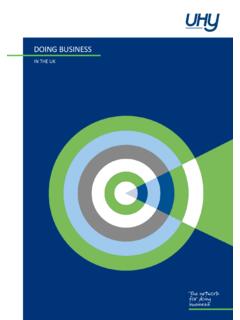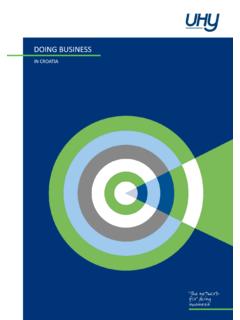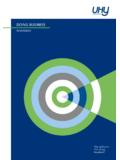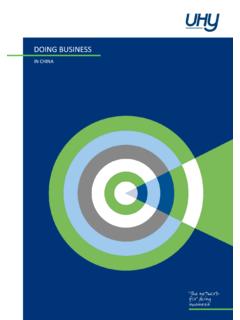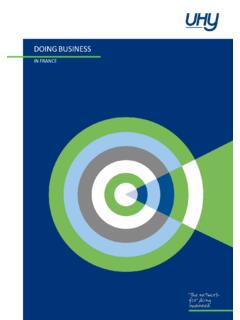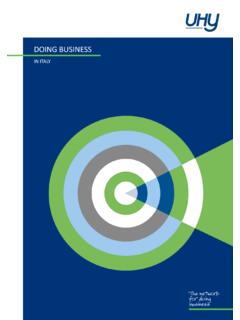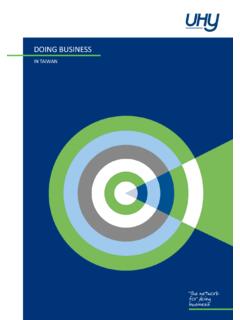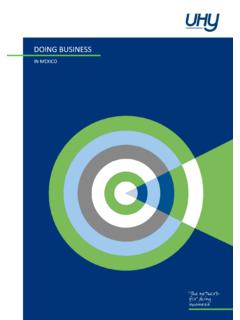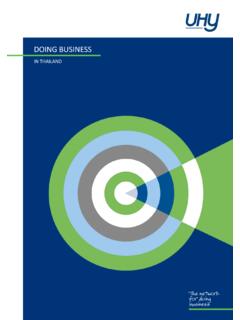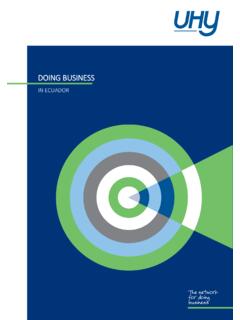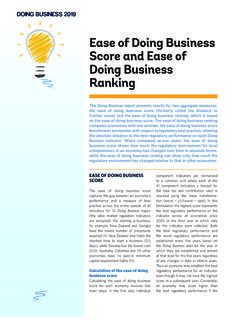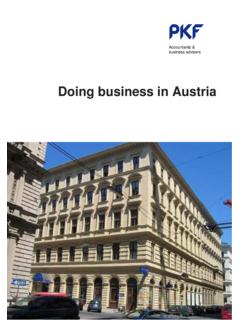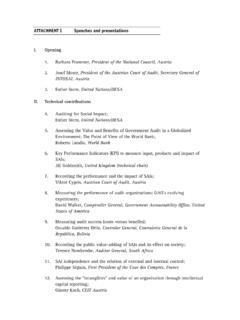Transcription of UHY Doing Business Guide
1 Doing Business . IN MAURITIUS. CONTENTS. 1 Introduction 3. 2 Business environment 4. 3 Foreign Investment 18. 4 Setting up a Business 25. 5 Labour 29. 6 Taxation 31. 7 Accounting & reporting 36. 8 UHY Representation in Mauritius 38. Doing Business IN MAURITIUS 3. 1 INTRODUCTION. UHY is an international organisation providing accountancy, Business management and consultancy services through financial Business centres in around 99 countries throughout the world. Business partners work together through the network to conduct transnational operations for clients as well as offering specialist knowledge and experience within their own national borders. Global specialists in various industry and market sectors are also available for consultation. This detailed report providing key issues and information for investors considering Business operations in Mauritius has been provided by the office of UHY representatives: UHY & CO.
2 Duke of York Street Champ de Mars Port Louis Mauritius Phone +230 213 34 61 / 211 3326. Website Email You are welcome to contact Nirmal Heeralall for any inquiries you may have. A detailed firm profile for UHY's representation in Mauritius can be found in section 8. Information in the following pages has been updated so that they are effective at the date shown, but inevitably they are both general and subject to change and should be used for guidance only. For specific matters, investors are strongly advised to obtain further information and take professional advice before making any decisions. This publication is current at October 2017. We look forward to helping you do Business In Mauritius. Doing Business IN MAURITIUS 4. 2 Business ENVIRONMENT. GEOGRAPHY AND HISTORY. Mauritius is an island of 1,969 square kilometres, situated almost in the centre of the Indian Ocean at around 2,000 kilometres off the south east coast of Africa.
3 It has a cosmopolitan population consisting of around million inhabitants of African, Chinese, Indian and European descent. The island was first visited by the Portuguese at the beginning of the 16th century. The Dutch followed in 1598, named the island Mauritius in honour of their Prince, Maurice Van Nassau, and settled until 1710. Five years later, the French took control of Mauritius and stayed until 1810, when the British invaded the island. Mauritius remained a British colony until 1968, when it obtained its independence from Britain and in 1992 became a republic within the Commonwealth. GOVERNMENT AND LEGAL SYSTEM. The country is a parliamentary democracy based on the Westminster model with elections held every five years and an independent judiciary. The legal system is a composite of the French Napoleon Code (civil law) and the British legal framework (common law).
4 LANGUAGE AND CLIMATE. English is the official language. French is widely used both in conversation, written communications and the print/audio- visual media. Creole, the local dialect and lingua franca, is spoken by all Mauritians. Mauritius has a sub-tropical climate with average temperatures varying from between 17 . 34 C in the summer (November to April) and between 15 27 C in the winter (May to October). CURRENCY AND TIME ZONE. The local currency is the Mauritian rupee (MUR); 1 USD = MUR 33 as of October 2017. Mauritius is four hours ahead of Greenwich Mean Time (GMT) and has no summer/winter time. ECONOMY. GROSS DOMESTIC PRODUCT. Mauritius has one of the highest gross domestic products (GDP) in Africa, with a current annual GDP per head of around USD 9,600. The GDP growth rate was approximately in 2016 and is forecast to grow to around in 2017.
5 Doing Business IN MAURITIUS 5. MAURITIUS ON THE WORLD SCENE (RANKINGS). Mauritius has built its success on a free market economy. The country ranks favourably on the world economic scene, as evidenced by the following world rankings: Africa No Index Global Rank Rank 49 out of 190. 1 World Bank Doing Business 2017 countries 1st 45 out of 138. 2 Global Competitiveness Index 2016 - 2017 countries 1st Corruption Perceptions Index 2015 (Transparency 50 out of 176. 3 International) countries 3rd 4 Mo Ibrahim Index of African Governance 2016 - 1st Press Freedom Index 2016 (Reporters without 61 out of 180. 5 Borders) countries 8th 2017 Index of Economic Freedom (Heritage 21 out of 180. 6 Foundation) countries 1st Economic Freedom of the World 2016 (Fraser 5 out of 159. 7 Institute) countries 1st 64 out of 188.
6 8 Human Development Index 2016 countries 2nd 18 out of 167. 9 Economist Intelligence Unit countries 1st 39 out of 136. 10 Global Enabling Trade Report 2016 countries 1st 77 out of 180. 11 Environmental Performance Index 2016 countries 1st 83 out of 230. 12 Mercer's 2016 Quality of Living Survey countries 1st 58 out of 193. 13 E-government development Index 2016 countries 1st 49 out of 139. 14 Global Information Technology Report 2016 countries 1st 39 out of 139. 15 Forbes Survey of Best Countries for Business 2017 countries 1st 55 out of 136. 16 The Travel and Tourism Competitiveness 2017 countries 2nd 40 out of 133. 17 Social Progress Index 2016 countries 1st MAIN SECTORS OF THE ECONOMY. AGRO-INDUSTRY. Significant Business opportunities exist in the agro-industry sector given that Mauritius imports 75% of its food supply.
7 Doing Business IN MAURITIUS 6. Mauritius offers the right Business environment in terms of fiscal incentives and infrastructure to develop this industry with the goal of decreasing its reliance on imports. To that end, the Ministry of Agro-Industry and Food Security has recently introduced a Bio- farming Promotion Scheme to encourage the development of bio-farming activities on a commercial scale. Incentives provided under the Scheme include: (a) Income Tax Holiday for the first eight years of operation;. (b) Value Added Tax Exemption on production equipment and other inputs;. (c) Loan facilities of up to 90% of project cost over 10 years at concessionary interest rates under the MauBank SME Financing Scheme; and (d) Fast track Business support solutions from the Food and Agricultural Research and Extension Institute (FAREI) and MyBiz.
8 Investment opportunities in agro-industry include: Seed production units for African countries that have similar climatic conditions Production of food crops that are not yet cultivated on a commercial scale in Mauritius Processing of fruits and vegetables Bio farming geared towards both the local and the export market Intensive dairy farming Technology-based farming organic farming of fruits and vegetables Aquaculture through partnership with large operators. MANUFACTURING SECTOR TEXTILES. The textile sector is a significant component of the manufacturing sector in Mauritius. In the face of the threat posed by the end of preferential access of Mauritian textile products to export markets, the sector has re-engineered itself by moving away from basic products to the higher end of the value chain.
9 Products exported to the European Union, Africa, the United States and Asia include pullovers, textile yarn, fabrics (including jeans fabrics) and jeans. With the largest vertically integrated textile and garment manufacturing facilities in sub- Saharan Africa, major fashion houses are choosing to source their products from Mauritian textile and garment companies. Significant emphasis is being placed to reposition the textile and apparel sector. As a result, a range of incentives are offered to investors. These include, among others: a) the free repatriation of profits b) duty-free import of inputs and machinery c) a major Air Freight Rebate Scheme which will entail a 40% reduction by the national carrier of the air freight cost to Europe d) Refund of 25% of the Basic Freight Cost to a maximum of USD 300 per 20-feet container and USD 600 per 40 feet container exported to 45 eligible ports in Africa including Madagascar and Reunion e) streamlined procedures for the recruitment of expatriates and foreign labour f) Exemption from corporate tax under the Freeport Scheme g) No Registration Duty and Land Transfer Tax on any transfer of a building or land earmarked for the construction of a building, to be utilised for setup of qualifying high- tech manufacturing activities Doing Business IN MAURITIUS 7.
10 Investment opportunities are available in: Knitting Dyeing and value-added finishing Manufacturing of value-added woven and knitted garments Testing and certifying laboratories Design and fashion institutes Manufacture of footwear, belts and handbags Cotton spinning and weaving International textile logistics services. NON-TEXTILES. Sectors other than textiles which present favourable investment opportunities for investors include: Electronics assembly of electronic products, such as computer components, laptops and household appliances Micro-mechanics and precision mechanics manufacture of minute precision-sets for the electronics, aeronautics and defence industries Clock and watch making assembly and production of parts and accessories Precision plastics manufacture or assembly of precision parts in plastic for a variety of industries (automotive, defence, medical, telecommunications etc.)
